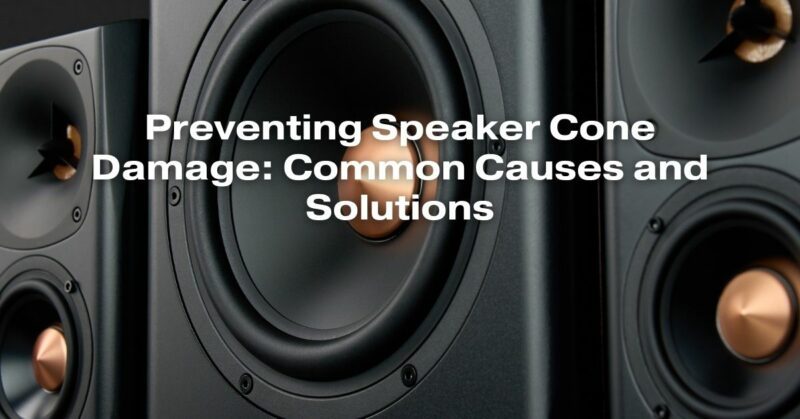Your speakers are one of the most important components of your sound system. They’re responsible for reproducing the audio signal from your amplifier or receiver and converting it into sound waves that you can hear. But speakers are delicate instruments, and the cones, in particular, are susceptible to damage.
Speaker cones are made of paper, plastic, or metal, and they’re responsible for vibrating to produce sound. If the cones are damaged, the sound quality will suffer, and in some cases, the speakers may even stop working altogether.
There are a number of things that can cause speaker cone damage, including:
- Overdriving the speakers: If you play your speakers too loud, the cones can be overdriven and damaged. This is especially true if you’re playing music with a lot of bass.
- Clipping: Clipping occurs when the amplifier tries to produce more power than it’s capable of. This can cause the audio signal to distort, which can damage the speaker cones.
- Mechanical damage: Speaker cones can also be damaged by mechanical means, such as being poked or hit with something. This can happen if you’re not careful when transporting or cleaning your speakers.
- Environmental factors: Speaker cones can also be damaged by environmental factors, such as humidity and dust. If your speakers are exposed to a lot of moisture or dust, the cones can become brittle and more susceptible to damage.
There are a number of things you can do to prevent speaker cone damage:
- Don’t overdrive the speakers: It’s important to play your speakers at a moderate volume level. If you’re not sure how loud you can play your speakers safely, err on the side of caution and turn them down a bit.
- Use a limiter: A limiter can help to prevent clipping by limiting the amount of output power from the amplifier.
- Be careful when transporting and cleaning your speakers: When you’re transporting your speakers, be careful not to bump them or drop them. When you’re cleaning your speakers, use a soft, dry cloth to remove dust and dirt.
- Protect your speakers from the elements: If you’re using your speakers outdoors, be sure to cover them when you’re not using them. If you’re using your speakers indoors, try to keep them away from sources of moisture and dust.
If you notice any damage to your speaker cones, such as tears or dents, it’s important to repair them as soon as possible. You can try to repair the damage yourself, but it’s best to take the speakers to a qualified technician for repairs.
Here are some additional tips for preventing speaker cone damage:
- Use the right speakers for the job: If you’re going to be playing your speakers at high volume levels, make sure you’re using speakers that can handle the power.
- Place your speakers correctly: Placing your speakers correctly can help to improve the sound quality and reduce the risk of damage. Avoid placing your speakers too close to walls or corners, as this can cause bass distortion.
- Get your speakers serviced regularly: Having your speakers serviced regularly can help to identify and repair any potential problems before they cause damage.
By following these tips, you can help to prevent speaker cone damage and keep your speakers sounding their best for years to come.


